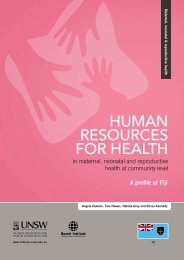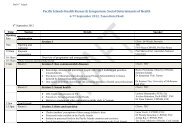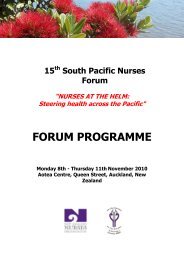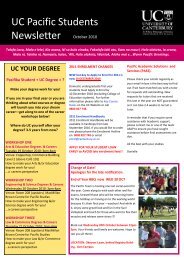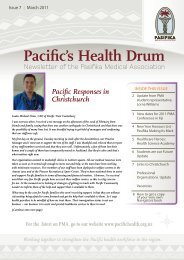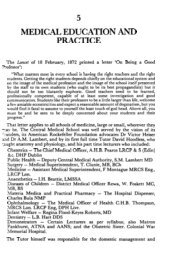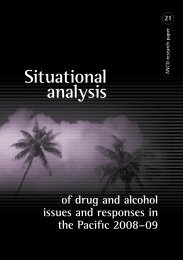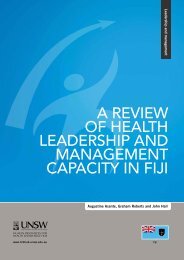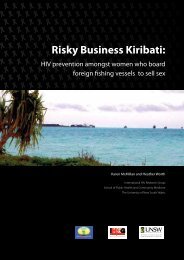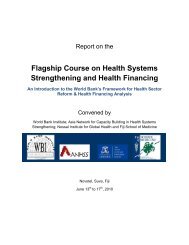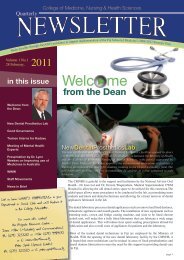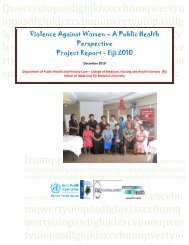rp21 situational analysis - Pacific Health Voices
rp21 situational analysis - Pacific Health Voices
rp21 situational analysis - Pacific Health Voices
Create successful ePaper yourself
Turn your PDF publications into a flip-book with our unique Google optimized e-Paper software.
Illicit Drugs Control Bill 2002 provided the<br />
model for the Tonga Illicit Drugs Control Act<br />
2003. 867 The Bill and subsequently enacted<br />
legislation were developed to address issues<br />
emerging around new drugs of concern including<br />
methamphetamines, which were not<br />
addressed in earlier legislation. If countries<br />
across the <strong>Pacific</strong> choose to adopt this model<br />
as the foundation of their drugs legislation,<br />
some consistency of approach will result at<br />
a regional level.<br />
In 2007, a legal mentor with the <strong>Pacific</strong><br />
Anti-Money Laundering Programme (PALP)<br />
responded to a request from Tongan authorities<br />
regarding the theft of precursor chemicals<br />
believed to be used for the manufacture<br />
of methamphetamines. PALP’s legal mentor<br />
provided assistance to the Government<br />
of Tonga’s review of its Money Laundering<br />
and Proceeds of Crime Act 2001 (MLPCA).<br />
The legal mentor also aided in the drafting<br />
of amendments to the Money Laundering<br />
and Proceeds of Crime Act, as well as<br />
drafting Bills for currency declaration and<br />
for the strengthening of a financial intelligence<br />
unit (FIU), resulting from a review<br />
in March 2007. The amendments to the<br />
MLPCA include serious offences designated<br />
by the inter- governmental Financial Action<br />
Task Force as predicate offences for money<br />
laundering. The Currency Declaration Bill,<br />
when passed, will assist in detecting bulk<br />
cash smuggling. The FIU Bill will provide the<br />
Tongan FIU with more extensive powers to<br />
investigate reports received from financial<br />
institutions of suspicious transactions.<br />
Law enforcement<br />
The Ministry of Police is heading data collection<br />
in relation to crimes committed under<br />
the influence of alcohol and other drugs,<br />
as part of the Ministry of Police Annual<br />
Plan 2008. 868 The Ministry of <strong>Health</strong> is also<br />
involved in this response. The Tonga Family<br />
<strong>Health</strong> Clinic provides information on STIs<br />
and HIV. The Salvation Army Alcohol and<br />
Drug Awareness Centre collects data from<br />
clients, while the Tonga National Centre<br />
for Women and Children on Violence also<br />
provides information on substance abuse. 869<br />
In his closing address to the Tonga Police<br />
Commissioned Officers 39th Conference in<br />
October 2008, 870 the Tonga Police Commander<br />
identified drugs and alcohol as an<br />
issue of concern for the future but also highlighted<br />
many competing priorities, including<br />
community policing. Notably, community<br />
policing responses may be compatible with<br />
innovative responses to alcohol and other<br />
drug issues, and the potential to coordinate<br />
responses requires further investigation.<br />
177<br />
867 Burnet Institute & Turning Point Drug and Alcohol Centre (2006), Situational Analysis of Illicit<br />
Drug Issues and Responses in the Asia–<strong>Pacific</strong> Region. ANCD Research Paper 12. Canberra:<br />
Australian National Council on Drugs.<br />
868 A key informant noted that little priority is given to substance use issues; therefore, it was<br />
difficult to determine a specific approach to substance use issues, punitive or otherwise.<br />
869 Key informant interview, February 2009.<br />
870 Available at: <br />
(accessed March 2009).<br />
Tonga



